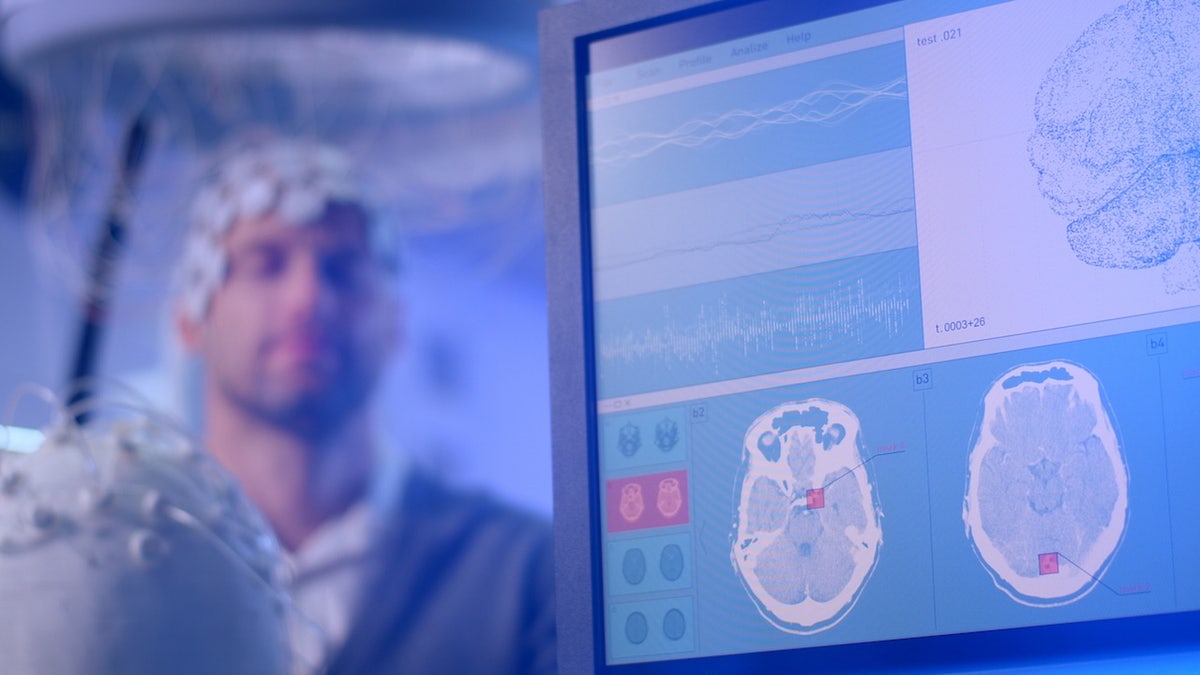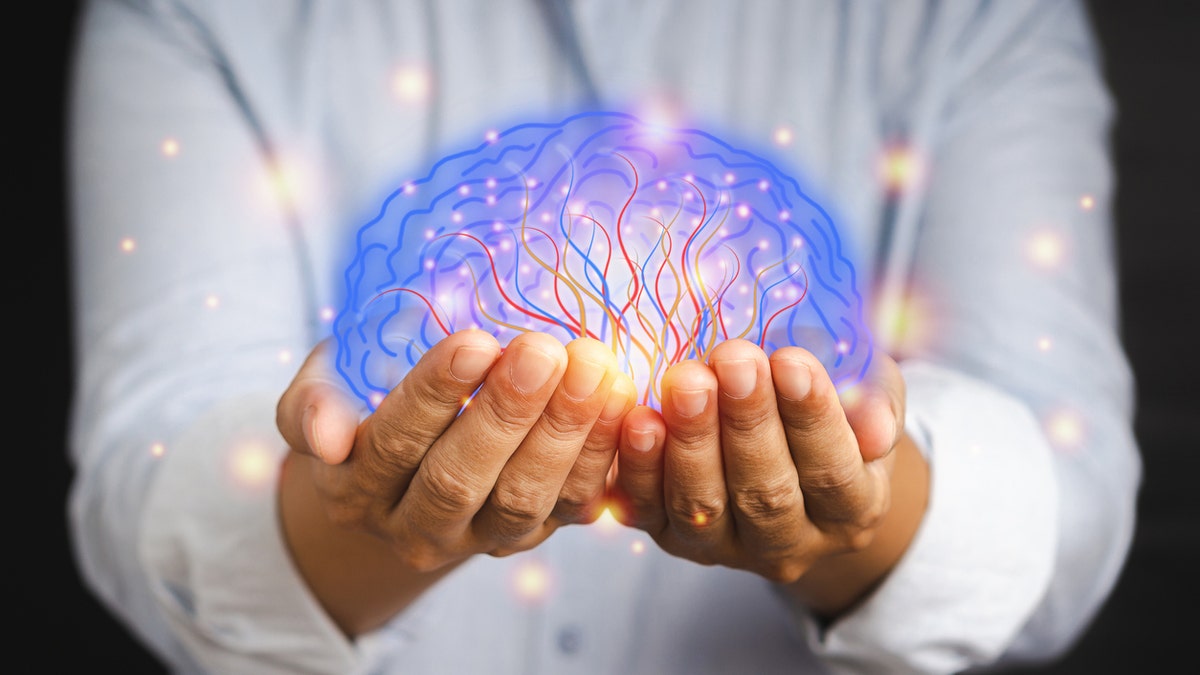As dementia becomes more widespread, Mayo Clinic researchers believe that artificial intelligence is the key to enabling earlier and faster diagnoses.
By pairing AI and EEG (electroencephalogram) tests, the team at the Mayo Clinic Neurology AI Program (NAIP) in Rochester, Minnesota, was able to identify specific types of dementia sooner than they would have through human analysis.
Based on these findings, EEGs could eventually provide a more accessible, less expensive and less invasive way to assess brain health earlier, according to a hospital press release.
WHAT IS ARTIFICIAL INTELLIGENCE?
The research was published last week in the journal Brain Communications.
What is an EEG?
With an EEG, a technician attaches small metal electrodes to the patient’s scalp, which measure electrical activity in the brain.
The test produces a recording of wavy lines that represent the brain’s electrical impulses.
An electroencephalogram (EEG) is a test that measures electrical activity in the brain using small, metal discs (electrodes) attached to the scalp. This activity shows up as wavy lines on an EEG recording. (iStock)
It is primarily used to diagnose epilepsy, but can also be used to identify other brain conditions, according to Dr. David Jones, a practicing clinician specializing in behavioral neurology, who directs the artificial intelligence program at Mayo Clinic in Minnesota.
MAYO CLINIC FINDS NEW TYPE OF MEMORY LOSS THAT’S OFTEN MISTAKEN FOR ALZHEIMER’S
The clinic performs thousands of EEGs each year to evaluate patients with neurological problems.
It’s been known for some time that brain wave patterns change in patients with dementia or cognitive problems caused by Alzheimer’s disease or Lewy body disease, Jones said in a phone interview with Fox News Digital.
“However, it takes a lot of specialized analysis, expertise and manual labor to extract that information, so Alzheimer’s and dementia are not routinely assessed on EEG.”
Tapping into ‘hidden information’
With this study, the researchers set out to find “hidden information” in patients’ brain waves using computer algorithms, without manual labor, Jones said.
The AI tool was built in-house at Mayo Clinic, trained on data from more than 11,000 patients who received EEGs over a decade-long period.

EEGs are primarily used to diagnose epilepsy, but they can also be used to identify other brain conditions. (iStock)
In analyzing complex brain waves, the model identified six specific patterns that appeared in patients with Alzheimer’s or Lewy body disease that were not found in those who had no cognitive trouble, according to Jones.
The correlation was confirmed by also looking at other measures, such as cognitive testing, blood biomarkers and brain PET scans.
ALZHEIMER’S ON MOTHER’S SIDE OF THE FAMILY COULD INCREASE DISEASE RISK, STUDY FINDS
Overall, the AI tool decreased the EEG reading time by 50% and increased the accuracy of those readings “pretty significantly,” Jones said.
“This tells us that there is a lot of unused information in clinically acquired EEGs that we can extract automatically — and now we can begin to build better tools, algorithms and methods,” Jones said.

The team at the Mayo Clinic Neurology AI Program (NAIP) in Rochester, Minnesota, was able to identify specific types of dementia sooner than they would have with human analysis. (iStock)
It would be “very difficult” to perform this type of analysis at scale without AI or machine learning technology, according to the neurologist.
‘Significant leap forward’
Harvey Castro, a Dallas-based board-certified emergency medicine physician and national speaker on artificial intelligence in health care, was not involved in the study but referred to Mayo Clinic’s research as “a significant leap forward.”
“This technology can rapidly and precisely analyze brain wave patterns, identifying early signs of dementia often invisible to the human eye,” he told Fox News Digital.
“There is a lot of unused information in clinically acquired EEGs that we can extract automatically.”
As an ER doctor, Castro said he does not typically use EEGs due to the time required to interpret the results.
“However, AI technology allows for fast processing of large amounts of data, facilitating quicker, more informed decisions about a patient’s cognitive health,” he said.
“As a result, I can see this becoming a new tool for me to use in the ER.”

The end goal is to incorporate brain scans, blood work, cognitive tests and brain waves into “one complete model of brain health,” a researcher said. (iStock)
AI-driven EEG analysis could be a “game-changer” in rural and underserved areas, according to Castro.
“It provides a cost-effective, non-invasive method to screen for cognitive issues early, where advanced diagnostic tools like MRIs or PET scans are limited.”
Next steps
The ultimate goal is to include this AI-driven EEG analysis into a “multimodal” approach to dementia testing, according to Jones.
“That means being able to model brain scans, blood work, cognitive tests and brain waves into one complete model of brain health,” he told Fox News Digital.
ARTIFICIAL INTELLIGENCE DETECTS CANCER WITH 25% GREATER ACCURACY THAN DOCTORS IN UCLA STUDY
The next step is to implement the AI tool into routine clinical practice.
“So if you’re coming in and having an EEG for epilepsy or a sleep study, we’ll also simultaneously be able to tell you something about your cognitive health, and whether we see something that means you might need to see a behavioral neurologist,” Jones said.

There are still several years of research ahead before this technology becomes widely accessible, the researcher noted. (iStock)
In the future, the neurologist envisions EEGs becoming a “highly scalable and portable” technology, where people can even perform cognitive assessments remotely — “in the same way that you measure blood pressure or heart rate in your own home.”
CLICK HERE TO GET THE FOX NEWS APP
There are still several years of research ahead before this technology becomes widely accessible, Jones noted.
Potential risks and limitations
Despite the benefits of this type of technology, Castro cautioned that there are challenges with integrating AI into clinical practice.
“While AI can provide valuable insights, the clinician’s expertise and empathy remain irreplaceable.”
“These include the need for substantial training for health care professionals to use these tools effectively and the potential for over-reliance on AI at the expense of clinical judgment,” he told Fox News Digital.
It’s also important to balance the use of AI with a “human touch,” Castro said.
CLICK HERE TO SIGN UP FOR OUR HEALTH NEWSLETTER
“While AI can provide valuable insights, the clinician’s expertise and empathy remain irreplaceable in delivering holistic patient care.”
Other considerations include ensuring patient data privacy, obtaining informed consent and working to prevent biases in AI algorithms, the doctor added.

In analyzing complex brain waves, the model identified six specific patterns that appeared in patients with Alzheimer’s or Lewy body disease that were not found in those who had no cognitive trouble. (iStock)
Jones, the Mayo Clinic neurologist, acknowledged that there are risks in relying too heavily on algorithms, but emphasized that the technology is designed using “real-world data for real-world use.”
“Its value is gauged by whether it’s helping us take care of our patients — that’s our focus.”
For more Health articles, visit www.foxnews/health
The team is “well aware” of potential problems and takes steps to mitigate them, Jones told Fox News Digital.
“We follow good AI and machine learning practices as part of the ethos of our software design and the values of Mayo Clinic.”

